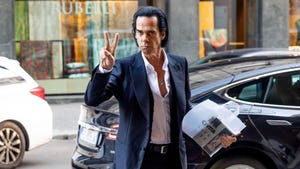
Nick Cave Hates ChatGPT Song Written in His Style: 'A Grotesque Mockery' - CNET
“I’ve got the fire of hell in my eyes.”
That line from a song created by experimental AI chatbot ChatGPT “in the style of Nick Cave” pretty aptly encapsulates the singer-songwriter’s take on the tune.
“This song is bullshit, a grotesque mockery of what it is to be human,” the Bad Seeds frontman wrote on his website The Red Hand Files, where he answers fans’ questions from the amusing to the existential — on music, movies, artistic inspiration, god, love and a whole lot else.
The song, submitted by one Mark in New Zealand, isn’t the only ChatGPT-composed “Cave” song fans have shared with the 65-year-old Australian rocker. He’s gotten dozens since the release of OpenAI’s new tool, which responds to written questions and prompts, formulating answers from massive amounts of data on the internet.
The tool can write AP English essays, jokes, poetry, computer code and, clearly, songs “in the style of Nick Cave,” and it’s stirring up amazement, amusement, fear and seemingly endless stunts aimed at testing just how intelligent this artificial intelligence really is. But while Cave acknowledges ChatGPT can probably write serviceable sermons or obituaries, he’s firmly planted in the camp that doesn’t see AI tools winning Grammys.
“Songs arise out of suffering, by which I mean they are predicated upon the complex, internal human struggle of creation and, well, as far as I know, algorithms don’t feel,” Cave writes. “Data doesn’t suffer. ChatGPT has no inner being, it has been nowhere, it has endured nothing, it has not had the audacity to reach beyond its limitations, and hence it doesn’t have the capacity for a shared transcendent experience, as it has no limitations from which to transcend.”
Cave describes songwriting in poetic, deeply felt human terms that do an excellent job underscoring his point. It’s hard to imagine ChatGPT coughing up a paragraph like the one below — just yet at least.
“Writing a good song is not mimicry, or replication, or pastiche, it is the opposite,” the musician writes. “It is an act of self-murder that destroys all one has strived to produce in the past. It is those dangerous, heart-stopping departures that catapult the artist beyond the limits of what he or she recognizes as their known self.”
Expect to see many more artists weighing in on AI attempts at creativity, which aren’t, of course, created in a vacuum. Artificial intelligence absorbs and reconstructs existing art by humans, raising ethical and copyright concerns among artists and even lawyers in the process. As well as questions about the very nature of art.
Editors’ note: CNET is using an AI engine to create some personal finance explainers that are edited and fact-checked by our editors. For more, see this post.

